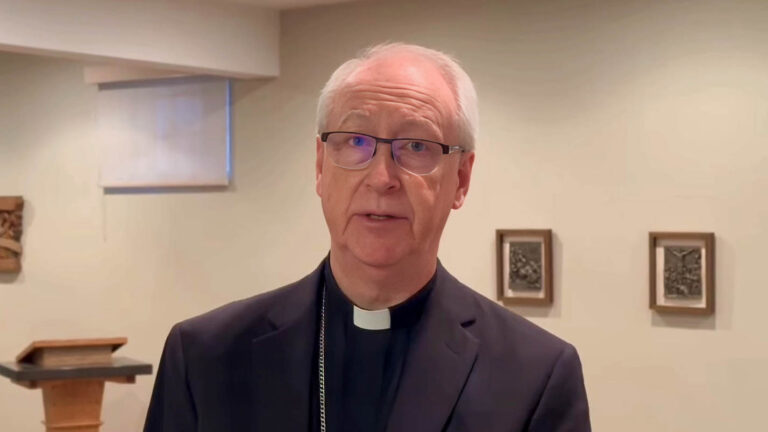Sixth Sunday in Ordinary Time – Year B
World Day of the Sick 2024
Homily
[Leviticus 13:1-2, 45-46; Psalm 32; 1Corinthians 10:31-11:1; Mark 1:40-45]
Our celebration of mass today occurs just prior to the beginning of Lent. These last days prior to Ash Wednesday are typically the time we prepare ourselves for the encounter in this holy season with the mercy of God. I suggest that the encounter between the Lord Jesus and a leper recorded in today’s passage from St. Mark’s Gospel can be a very helpful guide for our preparation.
First of all, let’s take note of how boldly the man approached Jesus for healing. As we know, leprosy had no known cure at that time, and was highly contagious, often lethal. Consequently, the leper had to live apart. Furthermore, anyone suffering from leprosy was considered ritually unclean and thus prohibited from having any participation in community worship. The degree of shame and isolation brought about by this terrible affliction was dramatically captured in the first reading from Leviticus. But the leprous man did not allow his public shame to keep him separated from the One he intuitively realized could bring him healing.
From this arises our first consideration as we prepare for Lent. Sin can cause us to experience deep inner shame. Is this keeping me from approaching the Lord in the sacraments? We know with certainty that the healing and restoration for which our soul longs can only be given by Jesus, and that he makes his mercy available in the sacraments he has given to the Church. Yet, am I choosing out of shame to stay apart? Implicit in the boldness of the leper is an invitation for us to be bold as well, to place our full confidence in the love of Christ and go forward to him without fear and be embraced and renewed by his healing mercy.
Now let’s consider what happened to Jesus as a result of his encounter with the leper. Our attention tends naturally to the positive result for the leprous man, but Jesus also was affected. We are told that, because the word of this miraculous healing was spreading far and wide, “Jesus could no longer go into a town openly.” In this sense, Jesus became like the leper, isolated and apart. Here we have a clear sign of the lengths to which Jesus went in order to heal and save us. His love came at great personal cost, even to the point of his death on the Cross.
Our call as Christians, we know, is to love like that, to love as Jesus loves. Christian love involves personal sacrifice for the sake of the other. We heard Saint Paul put it this way: “I try to please everyone in everything I do, not seeking my own advantage, but that of many”. As we prepare for Lent, we usually think of the sacrifice that we shall make, what we shall “give up”. Allow me to suggest, in light of our call to Christian love, that we give up self-concern. We live in a culture that exalts the Self, that places great value on the pursuit of self-interest and personal aggrandizement. Our immersion in this ocean of selfishness can cause us at times to adopt this same attitude. Let’s pray for the grace this Lent for hearts that are truly selfless, and ask the Lord to show us how we might give ourselves in sacrifice to serve no longer our own interests but henceforward the needs of others.
One possible way we might do this is suggested by our observance this weekend of the World Day of the Sick. This occurs annually on February 11th, and is marked by a letter from the Holy Father to the whole Church. In his message this year, Pope Francis laments deeply the separation and isolation occasioned by illness in many people’s lives. This is exacerbated in our day, when human dignity is measured in terms of utility, a mindset that causes people who have grown infirm and weak to be forgotten, often cast aside. The Holy Father reminds us of our duty as Christians never to move away from the sick but instead always to draw near to them as a reflection of the close tenderness of Christ, who did not run away from but toward the leper.
Let’s ask ourselves, then, what opportunities we have to care for the sick, one of the corporal works of mercy that characterize the Christian way of life. How might I go out of myself, sacrifice myself, to be more available to the ill, the homebound, the lonely? Is there someone in my family I have not visited in a long while? Have I considered volunteering in any of our Catholic healthcare facilities? Do I pray regularly for the sick and the dying? Are there fellow parishioners now housebound that I might call or with whom I could spend some time?
The great sacrifice that Jesus made of himself for our sake, his self-gift on the Cross, is rendered present to us here in the mass. Once more, we, who are sinful, are given the wondrous gift of encounter with our Lord who loves us beyond measure, and stands always ready to heal and renew us in his love. Let us approach him, then, with great boldness, as did the leprous man, confident in the unlimited power of Jesus and his unconditional love. May the grace of this encounter carry us into the Lenten season, where we pray for the gift of hearts that are truly and deeply converted, turned outward towards others in selfless Christian love.
Most Reverend Richard W. Smith
Saint Joseph Basilica
February 11th, 2024



